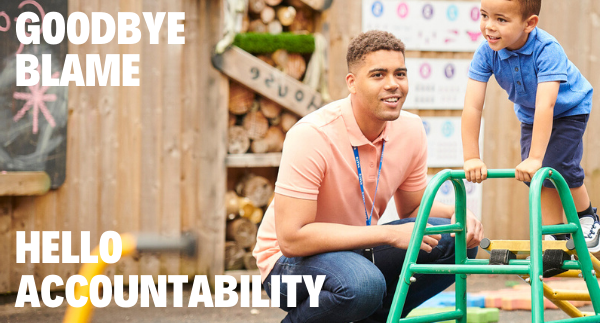
With COVID-19 once again disrupting well-laid plans, it’s never been more important to create a safe space for our team to help them feel supported and protected. The Leadership Umbrella principle suggests that it’s the role of leaders to hold an umbrella over their team. The umbrella acts as protection and forms a safe space for those beneath it.
The Leadership Umbrella creates an environment of psychological safety. Psychological safety is the belief that you won’t be punished or humiliated for speaking up with ideas, questions, concerns, or for making mistakes.
When Educators feel protected by the Leadership Umbrella, they feel comfortable being themselves and bringing their full selves to work. The role of the umbrella is to provide protection from the swirling winds of conflict and to shelter Educators from the rains of gossip and blame.
Beneath the Leadership Umbrella is a calm space where communication is clear, and Educators feel supported and encouraged. Beneath the Leadership Umbrella, they are safe from the hail of blame when mistakes are made. They are happy to take accountability for their tasks and attitude. They are aware that even if they do make mistakes, they will be supported to learn and grow from the event. They trust that the people around them will speak positively about them and that their leaders will be cheerleading for their success.
During periods of stress and pressure, sometimes umbrellas are unopened, leading to Educators feeling uncertain and anxious about the future.
Here are 3 great ways to open your Leadership Umbrella for your team. (Flip the cards to read the stories.)
1. Free people from the need to fit-in.
Everyone wants to be accepted. In traditional teams, this means not rocking the boat and becoming whom you need to be to “fit in.” Great leaders respect and encourage diversity in thought, communication, and approaches. When leaders open their Leadership Umbrella Educators are encouraged to be authentic, to say how they feel and speak up, even if their idea is disruptive or appears unpopular. When Educators feel like they belong to the team, they will feel safe to bring their whole selves to work.
2. Develop predictable rituals amid the unpredictability
Rituals focus the mind, build engagement, and help create a shared purpose. All the best teams have rituals. They help bring people together, move through conflicts and assist teams in adapting to change. When services have rituals at work it can reduce levels of stress and help maintain a positive service culture.
3. Accept, demonstrate, and demand accountability.
When leaders demonstrate accountable behaviour, it becomes accepted and expected. Holding Educators accountable isn’t about blame or catching people out. Holding Educators accountable demonstrates that their skills and talents are valued. If you ignore poor performance or missed deadlines, you’re sending the message that “what you do here doesn’t really matter”. Holding your team accountable demonstrates that you trust them, take their work seriously, and that you value their ideas.
Leaders are responsible for the protection, support, and encouragement of those beneath their umbrella. When we provide safe spaces to work in, Educators can be at their best. If you want a service culture that is supportive and encouraging, make sure there’s a place beneath your Leadership Umbrella.
About the Author:
Adrian Pattra is a management consultant with a Master of Education (Ed. Psychology). He is currently facilitating Leadership Essentials, a 3-hour foundational leadership program for new and existing leaders.
